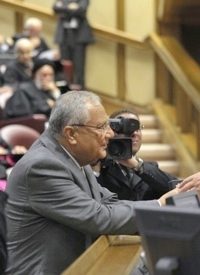
Reuters News reported on October 15 that Mohammad Sammak, a Sunni Muslim who serves as secretary general of Lebanon’s Christian-Muslim Committee for Dialogue, told a synod of bishops that the loss of Christians from the region was an “impoverishment.”
Sammak was invited by Pope Benedict XVI to address the Vatican conference, officially called the two-week Special Assembly of Bishops for the Middle East, to lend his perspective to the discussion about how to protect minority communities in the region.
"The emigration of Christians is an impoverishment of the Arabic identity, of its culture and authenticity," said Sammak, who is an advisor to Lebanese Prime Minister Saad Hariri. He added that maintaining the Christian presence in the Middle East was a "common Islamic duty as much as a common Christian duty."
According to the Australian publication Christian Today:
In addition to the bishops, the meeting will be attended by 14 Roman Curia officials, 14 non-Catholic Christians and 30 academic experts. Among those expected to join are Rabbi David Rosen of the American Jewish Committee and Fr Pierbattista Pizzaballa, the Vatican’s Custodian of the Holy Land.
Another Muslim invited to address the conference was Ayatollah Seyed Mostafa Mohaghegh Damad Ahmadabadi, an Iranian Shi’ite law professor at Shahid Beheshti University in Tehran, who addressed the need for maintaining security for communities of varying sizes and beliefs. "The stability of the world depends on the stability of the livelihood of small and large groups and societies," Damad said. "This stability could only be achieved when all can live without fear and threat from others. This is our duty to bring about such conditions."
Another report from the Catholic News Service quoted Sammak’s description to reporters of the plight of Middle Eastern Christians, and his opinion that the emigration of Christians from the Middle East is a result of a "lack of democracy, a lack of freedom" in the region and not the result of religiously motivated pressure from Muslims.
Addressing the situation of Christians in Iraq since the removal of Saddam Hussein (whose close advisor, Tariq Aziz, was a Chaldean Christian), Sammak said Iraqi Christians unwittingly were caught in the middle of a struggle for power that has pitted Sunni Muslims against Shiite Muslims.
"Christians of Iraq are not — and I underline not — part of that conflict," said Sammak, but "they are caught in the middle of the conflict and they are paying the price for it."
In addition, he said, "Christians of Iraq had nothing to do with the invasion, they didn’t call for the Americans to come to Iraq, they didn’t ask for American protection, and yet they are sometimes treated as if they are part of the American invasion of Iraq."
An article in the Christian Post for October 9 quoted Archbishop Nikola Eterovic, secretary general of the Synod of Bishops, who told reporters that the special assembly at the Vatican was the result of requests from several bishops and the desire of Pope Benedict XVI after he made apostolic trips to Turkey, the Holy Land, Jordan, Israel, Palestine, and Cyprus in 2010.
“It will also be an invitation to the international community, and more importantly to the countries that can and want to dedicate themselves, so that the people of these regions can finally move toward a path that brings them to peace and justice and mutual respect for the law and rights responsibilities of others,” said Archbisop Eterovic.
The reasonable dialogue expressed by non-Christian guests at the Vatican conference — some of whom are normally regarded as adversaries of Christianity and the West — is perhaps indicative of how cultural and religious chasms can be bridged when genuine good will prevails.
Those who have studied the roots of the violent conflicts in the Middle East have usually found that they stem not mainly from religious differences, but from the creation of terrorist organizations by secular agents sent to the Middle East from communist nations to exploit those historic differences to advance their own agenda of world domination.
For background information about how terrorists in the Middle East have been supported by communist states, see William F. Jasper’s exposé, “No State Sponsors, No Terror,” published here on August 18, 2009.
Photo: Muhammad Al-Sammak political adviser to the mufti of Lebanon, is greeted by Pope Benedict XVI (out of picture) during the synod of bishops from the Middle East, at the Vatican, Oct. 14, 2010: AP Images


